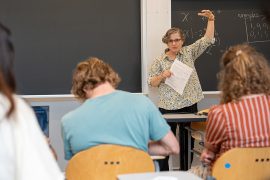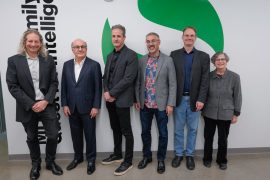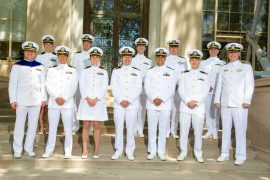Computing innovation for positive impact

The MIT-Google Program for Computing Innovation helps generate research that uses computing to positively impact society, increase research capacity, and create a more diverse future.
Tremendous advances in computing provide potent new ways of tackling the diverse array of global societal and sustainability issues confronting the world today. From large language models, to simulation, to virtual reality, researchers are tapping into novel computing tools and methods to come up with solutions, but technology alone can’t solve the world’s problems.
Building on growing intellectual connections, MIT scholars are crossing disciplinary boundaries and looking at how computing can help address these challenges from multiple perspectives. Teams of researchers are collaborating on areas of mutual interest and exploring technologies that can help achieve sustainable mobility, mitigate climate change, increase accessibility, and foster productive partnerships between machines and humans, amongst others.
Fueled by the MIT-Google Program for Computing Innovation, a collaboration launched in 2023 between MIT and Google, hosted by the MIT Schwarzman College of Computing, 13 projects have been awarded funding in this second year of the collaboration, with each targeting one of the following strategic areas of inquiry: computing for the health of the planet, responsible computing, efficient computing, and computer-aided creativity.
“Computing offers powerful new solutions, and is evolving to the point where it is redefining our approach to problem-solving in nearly every discipline,” says Daniel Huttenlocher, dean of the MIT Schwarzman College of Computing and Henry Ellis Warren Professor of Electrical Engineering and Computer Science. “The rapid advances in computing technologies call for fundamental research, interdisciplinary collaboration, a focus on ethical considerations, and a commitment to using computing responsibly to generate beneficial outcomes. The selected projects are bringing MIT’s bilingual computing researchers together to develop technological solutions with potential for scientific and real-world impact.”
Supported by a five-year, $18 million commitment of philanthropic, sponsored-research, and in-kind support from Google, which first opened its Cambridge headquarters in 2002, the MIT-Google Program for Computing Innovation aims to help generate research that uses computing to positively impact society, increase research capacity, and create a more diverse future.
“The MIT-Google Program for Computing Innovation is supporting interdisciplinary research in societally-important areas like health, sustainability, creativity, and responsible computing. The program speaks to Google and MIT’s shared commitment to improving people’s lives through research, technology, and tangible solutions, and the importance of interdisciplinary and cross-sector collaboration,” says James Manyika, Google’s senior vice president of research, technology and society and the program’s executive sponsor.
In addition to research projects, the program is providing cloud platform support to MIT researchers and is enabling a set of research inclusion initiatives, including MEnTorEd Opportunities in Research (METEOR), a postdoctoral fellowship program that was established by the Computer Science and Artificial Intelligence Laboratory (CSAIL).
“It is critical that we support exceptional researchers in computer science and artificial intelligence. By opening our doors and providing research opportunities and mentorship, we hope we can assist in preparing these individuals for successful careers in academia or industry, as well as broaden participation in the field,” says Armando Solar-Lezama, the Distinguished Professor of Computing in the MIT Schwarzman College of Computing, associate director and chief operating officer for CSAIL, and the faculty director of the MIT-Google Program for Computing Innovation.
The 13 selected projects and research leads include:
- “A Scalable and Automatic Framework for Large Language Models Red Teaming and Alignment,” led by Pulkit Agrawal, associate professor in the Department of Electrical Engineering and Computer Science (EECS);
- “AI That Knows When It’s Wrong: Advancing Uncertainty Estimation for Trustworthy Computing,” led by Navid Azizan, Esther and Harold E. Edgerton Career Development Assistant Professor in Mechanical Engineering (MechE) and the Institute for Data, Systems, and Society;
- “Detecting Rapid Biodiversity Changes with Species Distribution Models,” led by Sara Beery, Homer A. Burnell Career Development Professor, EECS;
- “Can It See What I See? In Search of Computer Vision Algorithms that Respond to Visual Illusions as Humans Do,” led by James DiCarlo, Peter de Florez Professor of Systems and Computational Neuroscience;
- “Efficient Nearest Neighbor Search with Multiple Similarity Functions,” led by Piotr Indyk, Thomas D. and Virginia W. Cabot Professor, EECS;
- “Generating High-Quality, Task-Specific Data for the Real World,” led by Phillip Isola, Class of 1948 Career Development Chair Associate Professor, EECS, and Sara Beery, Homer A. Burnell Career Development Professor, EECS
- “Efficient Neural Architectures for Sequence Modeling,” led by Yoon Kim, NBX Assistant Professor, EECS;
- “Advanced Optimization for Neural Network Training with Differential Privacy,” led by
Rahul Mazumder, Nanyang Technological University Associate Professor of Operations Research and Statistics; - “Augmenting Generative AI with Mechanical Simulation: Producing 3D Printable Models by Incorporating Structural Analysis in Generative AI Design,” led by Stefanie Mueller, TIBCO Founders Professor in EECS and MechE;
- “Science-based Metrics for Corporate Biodiversity Impact,” led by Serguei Saavedra, associate professor in the Department of Civil and Environmental Engineering;
- “Nonlinear Stochastic Emulators for Quantifying Climate Risk of Extreme Weather Events,” led by Themistoklis Sapsis, William I. Koch Professor of Mechanical and Ocean Engineering, MechE;
- “Scalable Approximate Nearest Neighbor Search with Applications to Clustering,” led by Julian Shun, associate professor, EECS;
- “Detecting AI-Generated Video with Neural Structure-from-Motion,” led by Vincent Sitzmann, Jamieson Career Development Professor, EECS.


